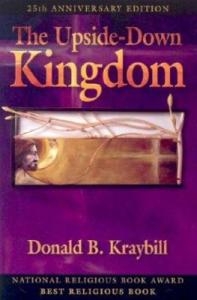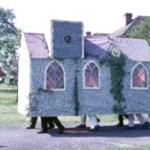The Upside Down Kingdom: Chapter Two: Mountain Politics
Just before re-reading The Upside Down Kingdom my wife and I watched the TV series “The Man in the High Castle.” It’s based on a book of the same title. The various plots of both the book and the series rest on the fiction that Germany and Japan won World War 2 and occupied America. Much of the story has to do with various resistance fighters against the Japanese and German occupiers. But there is one small subplot that doesn’t get much attention: A group of “Christians” construct an intentional Christian community in the mountains of Colorado (a so-called “Neutral Zone” between the German and Japanese colonies of America) to shelter Jews. The sheltered Jews get a lot of attention but the Christians who shelter them get almost none. But the point is—The Man in the High Castle made me think of Donald Kraybill’s “Mountain Politics” and vice versa. There’s a lot of violence in the former and the latter claims that Jesus refused to lead a violent resistance against the Roman occupiers, preferring to promote an entirely new and controversial social order based on love of enemies.
This chapter spends much time/space on the political crises in Palestine before, during and after Jesus’s lifetime on earth. One has to get through all that information to get to the point of the chapter. According to Kraybill’s, the devil tempted Jesus to become a political ruler using violence (which is a kind of tautology as all political rulers must use violence). Jesus declined saying “Get behind me, Satan.” Instead he taught a radical message of an alternative social order without violence and even without traditional rulership.
Did Jesus mean this ONLY for the church? Many say that. Reinhold Niebuhr among them. Baptist theologian Walter Rauschenbusch disagreed (before Niebuhr) and argued for a “Christianized social order” based on love. Niebuhr came along after Rauschenbusch and Pooh-poohed that as naive. Then, recently, along came Stanley Hauerwas who sort of bridged that gap, arguing that the church is meant by God to be an alternative social order within the godless, secular, pagan social orders of this world for the sake of the world, to be a shining example of how God intends humans to live together.
We will yet “see” where Kraybill lands in this 20th century debate about Christians and culture, but going by what he says in this chapter it appears that he will argue that Christians were never meant by Jesus to be political—in the sense of attempting to grab power to control the social order.
Whether Kraybill would agree more with Rauschenbusch, Niebuhr or Hauerwas may be unclear, but one thing is crystal clear to me: Kraybill is arguing against Christian Reconstructionism, Dominion Theology, merging MAGA with Christianity. Is he a pacifist? We will see; it’s not clear yet.
One question a person might (and some probably will) ask Kraybill is about the prophesied future in biblical apocalyptic literature, assuming it is prophesying the future. Doesn’t it point to a time when God, even Jesus, will violently destroy his enemies in order to set up a political kingdom, whether on earth (the millennium) or in a new heaven and new earth? Isn’t the God, Jesus, of The Book of Revelation (The Apocalypse of John) violent? We’ll see if he addresses that question later in the book.
For now, however, one thing is clear: Kraybill believes Jesus COULD HAVE become a political ruler who defeated the evil, occupying Romans, but chose not to. And yet he taught a different kind of social order that threatened both the Jewish leaders in Jerusalem and the Roman occupiers of Palestine because it challenged their rule by violence. What should contemporary America (and other) Christians think, then, about participating in rule by violence?
(I will comment on Chapter Three on or about Monday, September 25. Please don’t comment about that chapter or any later one until I have commented on it/them.)
*Note: If you have not read this chapter, don’t comment but only ask a question. If you have read the chapter, feel free to comment but keep it relatively brief (no more than 100 words), on topic, addressed to me (or Kraybill), civil and respectful (not hostile or argumentative) and devoid of pictures or links.*














